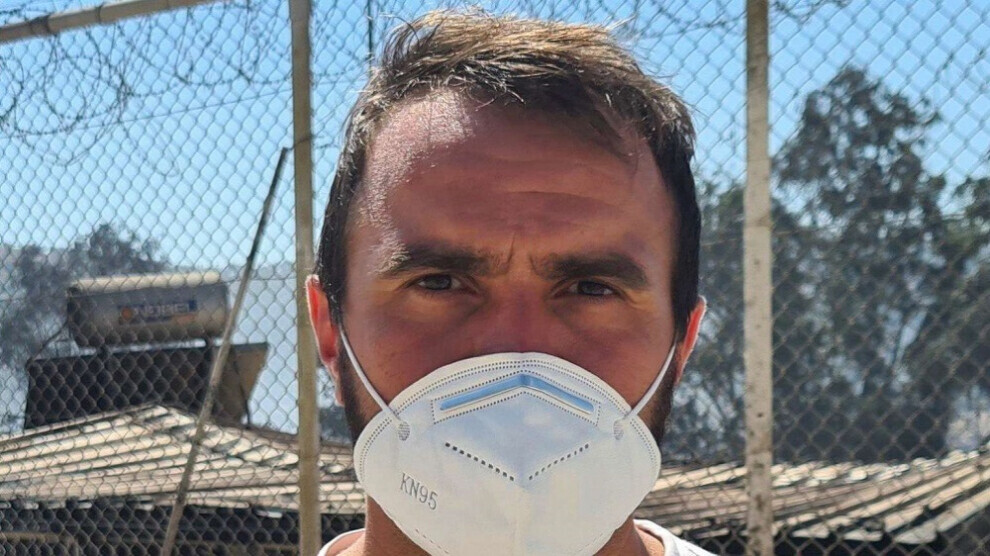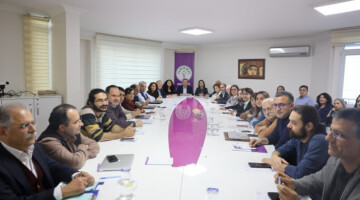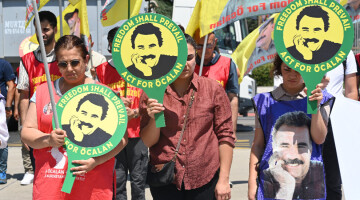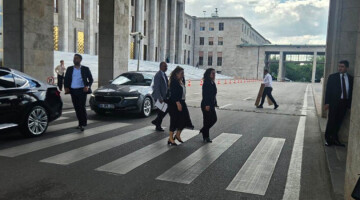Many migrants, including Kurds from Southern Kurdistan, died of cold and malnutrition on the Polish-Belarusian border.
As the region's problem worsens, it becomes evident by the day whose networks facilitate human smuggling and why so many people congregate at the border.
Jan Theurich is a member of the Dunya Collective, an organization that works in solidarity with migrants and publishes photos from various camps throughout Europe.
Theurich, who has long volunteered in refugee camps in Greece, became one of the human rights advocates working in the region during the recent fires.
Jan Theurich, a member of the Dunya Collective who has been following the events on the Polish-Belarusian border, spoke to ANF about the current crisis.
According to Theurich, Lukashenko, like Erdogan, is exploiting refugees as a trump card and that refugees are at risk of being attacked by Neonazi groups, as well as the dangers of cold and starvation.
How did Poland's refugee issue come to be?
Belarus held presidential elections in August 2020. These elections, as is well known, were fraudulent, and dictator Lukashenko's position was reaffirmed as a result. Following this, for the first time in Belarusian history, large-scale protests were held, which dictator Lukashenko suppressed with brutal interventions. In response, the European Union imposed sanctions on Lukashenko and his dictatorship, after which Lukashenko began to gather many asylum seekers from around the world, through direct or connecting flights, to Minsk in the spring of 2021, to use as a tool of leverage against the European Union. The European Union and the Lukashenko administration are playing a political power game.
Is this how people piled up on the border?
Lukashenko gathers refugees within the country and even deliberately directs them to the borders. Refugees are loaded onto buses and sent immediately to the border using official facilities. The Belarusian Army and the Belarusian Border Protection Committee lead the migrants on their journey, telling them in which direction to proceed. They provide some living necessities, at least water, as we've seen in recent videos. Some opposition groups in Belarus accuse the Lukashenko dictatorship of actively provoking refugees to cross the borders. Of course, it is necessary to say this about provocation; this also occurs as a result of people's free choice, as these people want to travel to Western Europe as well. As a result, it would be incorrect to believe that the Lukashenko administration is manipulating these people like willless puppets; people have free will, there is immigration autonomy, people migrate there because they want a better life, and they do so. As a result, while photos of asylum seekers pulling down the fence may appear violent or forceful, the de facto meaning of this action is to protect the European Union's still valid asylum laws against the Polish state and the European Union itself. These people have the right to apply for asylum and the rest must be decided after that. It is unthinkable to prevent people from using their fundamental rights through military intervention.
It is possible to get information from certain channels, but what exactly is the situation there?
On the one side, there is Belarus, where people are directed to the border and forced to stay there. Behind the people approaching the border are Belarus' border security troops, who are constantly firing warning shots; it is also extremely difficult for people who have gathered on the border to return. On the Polish side, 16,000 soldiers are currently deployed. The region is in a state of emergency, the press is barred from entering, and a convoy of aid delivered from Germany was barred from entering yesterday. Today, it came out that soldiers from the Polish army punctured the tires of a truck belonging to a Polish non-governmental group (Medycy Na Granicy/Border Medics), which provides medical assistance to Belarusian forests. In general, non-governmental organizations face plenty of challenges. Yesterday, a CADUS aid convoy from Germany was halted.
There are also significant barriers to receiving news from the region. In fact, it should be said that this is no longer possible, as a state of emergency has been declared. Poland is entirely sealing its borders, which the European Union welcomes. Poland, like the rest of the European Union and the European Commission, is essentially saying the same thing. It's a war language. Polish Interior Minister Mateusz Morawiecki, for example, says, "Polish borders are not merely a line on a map; this boundary was guarded with the blood of generations before us," and speaks to the citizens of Poland as if the German Army or Stalin's troops had launched another invasion. Such historical images are reenacted for people to support the nationalist cause.
In this context, the Minister of Internal Affairs of Poland conducted "frontal visits" and took pictures with soldiers while shaking their hands. On the one hand, there is this shameless game in which Belarus uses those seeking asylum because they live in deplorable conditions in their home country and puts human lives in jeopardy. It should be stated as clearly as possible that Lukashenko's policy must stop. On the other hand, the European Union must adhere to EU and international law by allowing these people to request asylum, which entails recognizing people's fundamental rights. The EU cannot use the military against fundamental human rights or frighten the people crowding the border at night with dog barking or loudspeakers in Arabic and Kurdish.
Another point worth mentioning is that Belarusian border guards are frequently firing warning bullets into the air. The aim is to intimidate people into staying on the border. There are videos about it. The Belarusian regime wants to exploit these people. Those who live in these conditions, those who suffer from hunger and agony are human! There are also many more vulnerable people among them, including children, the elderly, and women. In this case, the European Union cannot respond by closing its borders. The scenes there remind me of what we saw at the Turkish-Greek border in Turkey at the start of 2020. Dictators, whether Erdogan or Lukashenko, appear to employ the same methods to further their political goals. Human life has no value in this context.
You've also visited Greece. Given the current scenario, what is the overall image of the EU's refugee crisis?
At the same time, more people continue to arrive from the Mediterranean, and rescue activities have resumed. The Mediterranean Sea is one of the world's most dangerous escape routes. The situation on the Greek islands has not improved; it is still the same as it was last year. The condition in the Black Hill Camp, which was built after the Moria Camp on Lesbos was destroyed by fire, is also bad. This is not a camp, but rather a prison; people are not allowed to leave, and only one family member is permitted to leave for three hours per day. The situation is significantly worse at Samos. Here, a new camp was built and ringed by double wire fences and fortified with barbed wire. To deter escapees, there are frequent patrols between the two barriers which can be entered with a unique identity and fingerprint. The camp can only be left during specific hours, and those who do not return on time are barred from leaving for an extended period of time.
The slogan "There will be no more Moria" turned out to be a complete lie on this island. Nothing has changed, and even real concentration camps have been constructed here. Because the term prison does not apply here, I use the definition of a concentration camp. If you violate criminal law, you will be imprisoned. These people are not in these camps because they have committed a crime.
So, are these experiences similar and will they produce the same results?
The politics on these islands are very comparable to those on the Belarusian-Polish border today. With this strategy, it is explicitly stated to people who wish to come to the European Union, "You can't go in, and if you attempt, you will suffer greatly." This intimidation tactic is currently being used on the Polish-Belarusian border. They want this to be discussed and feared among people who want to migrate to Europe. This is one of the tools that the EU employs. The diplomatic tool is the other means. Some airlines, including Turkish Airlines, that transport asylum seekers to Minsk, are placed on the blacklist and subjected to sanctions.
Gerald Knaus, an Austrian migration researcher, has come up with yet another concept. Knaus is widely regarded as the architect of the EU-Turkey refugee agreement. Knaus is now seeking similar deals with other EU-bound third nations, such as Ukraine and Moldova. It's the same formula: assign responsibility for holding and caring for migrants in exchange for money, deport them to the third countries, then make decisions on asylum claims while they're there. This is the approach in the Turkey-EU agreement. This agreement, however, demonstrated that people remain rooted in their positions and that decisions are made slowly. Knaus' idea, despite the humanitarian issues raised by the EU-Turkey agreement, is a disaster in my opinion. The EU continues to utilize these agreements as a political tool for migration management in other countries, and neither people's nor their rights are important in this matter. The goal is to keep them from entering Europe.
Radical right organizations in Germany, known as the "Identitäre Bewegung," are calling for a mobilization towards the Polish border. There was also word that a group of right-wingers was making their way towards it. In Brandenburg and Saxony, the Nazis, “The 3rd Way” (Der III. Weg) for example, have recently called for a manhunt to "capture the illegals and turn them over to the police." In the East German countryside, near the border city of Zittau, a group known as the "Zittau Action Group" is on "patrol" and seeks to prevent people from crossing the border. The Federal Police reported two weeks ago that around 200 people who entered Germany illegally had been registered. Of course, Neonazis pose a threat to migrants; and there are also many families among the refugees. They can be vulnerable to Neonazis no matter how powerful they are.
What happens if the situation isn't taken under control? What are the potential risks lurking behind the German border?
A regional initiative has emerged in response to the actions of the Third Way Party, and something is being attempted. Solidarity actions with refugees will be staged this weekend in the border cities of Bad Muskau, Görlitz, and Zittau. There is also a group operating near the border in Poland, and they have filed an international appeal, requesting an independent observer group as well as medical and in-kind assistance from the Polish government. If the situation is not stabilized, the region will experience severe cold when winter arrives. If the situation is not stabilized, this forest will become a graveyard for many more refugees, and more migrants will perish in these forests. Under any circumstances, this must be avoided. It's difficult to say how many people died in those forests right now. Because of the state of emergency, no one from those forests can do independent journalism, as I have stated. Belarus is already ruled by a dictatorship.













